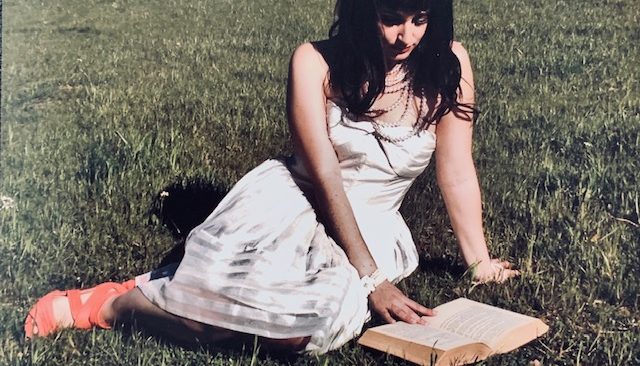Ah-HEM.
Tap. Tap. Tap.
HELLO! OH—There’s no one here. Wait a minute. There’s one guy in the back who keeps yelling, “SHOW US YOUR TITS!” Sorry, guy. Wrong blog.
Let’s try this again.
Some thoughts from the abyss, aka, Day 151 of sheltering in place on account of my high risk of dropping dead from COVID-19.
About two weeks into the rest of the world’s epidemic, I recognized the myriad of emotional responses collectively issued forth as belonging to a particular, familiar cultural phenomenon. Just two weeks of sheltering in place released a flood of navel-gazing think pieces, delicate “we’re here for you” television ads, angry mobs of spring breakers insistent on getting blackout drunk and fornicating with backwater strangers, and general consternation from the social media commentariat.
Thanks to my early lessons in things that make your life suck forever, I was not far behind the writers from Harvard Business Review and NPR in realizing that these complex and uncomfortable emotions are the result of grief. In fact, I argue that society’s mixed and somewhat confusing response to the COVID-19 viral pandemic not only perfectly models the six stages of grief, but also demonstrates how these stages are anything but linear.
Very likely you’ve wrapped yourself up in a blanket of existential crisis over the uncertainty of your future, whether it’s your health, your financial stability, or your ability to enjoy simple pleasures you once took for granted, like going to a bar with friends or enjoying a Fenway Frank at Fenway Pahk. The world may seem meaningless or overwhelming. You might be fuming at inept politicians or racist police officers or tone-deaf mask-deniers who have fumbled (or totally fucked) the response to the pandemic. You quite possibly have made a few personal bargains or pleas with the powers that be:
“If things go back to normal, I will never complain about obligatory family dinners again.”
However, despite losing many of the structural norms that define your days, weeks, wins and losses, you may also be rediscovering (or discovering for the first time) small joyful, bittersweet nuggets of salted caramel goodness. An old pastime or project collecting dust, buried under life’s minutiae, resurfaces and reminds you of who you are—or used to be. A new family tradition of 50 jumping jacks before flapjacks is born. Your vegetable and flower gardens are growing. Self-sufficiency is satisfying. And boredom, sweet boredom, is once again a factor in your life.
So you might be saying now, “Yah, so what? Things are both terrible and slightly okay right now. Mostly terrifying. Thanks for the genius revelation.”
You’re welcome.
The real reason I’ve come back to blog is to offer some advice on recognizing that the grieving process might be integral to surviving the pandemic with physical and mental faculties in tact. Put simply: We need to grieve our old lives before moving on to face our new ones.
Embrace the grief and give it the space it requires—without indulging in it. Because as it turns out, the emotional response to the global shelter-in-place order stemming from a novel coronavirus spreading rapidly through the population and killing at will is eerily similar to that experienced by receiving a terminal diagnosis of stage IV lung cancer from exposure to 9/11 dust and toxins. Who knew?
All the emotions making you uncomfortable right now; if you dig into them, you’ll find they fall rather neatly into the first four stages of grief: denial, anger, bargaining, and depression. What’s making it difficult to recognize them as such is that they don’t happen one after the other, like a step-by-step ascension into Nirvana. For example, three months into shelter in place orders, denial was still a factor for many. This virus will disappear in the summer, right? It has to! My kids will be back to school in the fall. They’ll have a vaccine ready by the end of the year, and this will all be over.
However, anger and depression are also very much at play. Look at the protests. The conspiracy theories. The growing violence on both sides of the political spectrum. The overworked parents lost in a sea of homeschool papers, emails, and Zoom meetings. The grandparents who can’t hug their little ones or have visitors in their nursing homes. The lonely single guy who lives alone and hasn’t felt the touch of another person in weeks—months!
One common response I see echoed across the Internet is the powerful desire to return to a state of normalcy. When can I see my family and friends and go to work and sit down at restaurants and enjoy concerts and stand closer than six feet next to someone I don’t currently want to choke? I would do ANYTHING just to go back! Bargaining. I know that pull. It’s a stage of grief I spent a year indulging until I finally allowed myself the realization: There’s no going back.
If my experience with cancer has taught me anything, it’s that the first four stages of grief spent fighting the loss are necessary to come to terms with and accept that the loss will happen or has happened. Acceptance doesn’t mean cured. It doesn’t mean a return to normalcy. Anyone who has lost an important loved one will tell you: There’s no getting over it. There’s only accepting that the loss took place and moving forward to find meaning in it. Gloss over any of these stages, and the grief will catch up to you in the end. Languish in them, and you’re in danger of missing out on their lessons.
So what does acceptance and finding meaning actually look like in this pandemic? As I’m still in the throes of the first four stages, it’s hard to be sure. What I do know is they don’t magically happen and erase all your misgivings and fears about death (because that’s what all your coronavirus fears boil down to, kids). But what they do is allow you to form a new picture of normalcy. What does my reality look like today? If it can’t be what it was, what is it, then? And what can it be in the future?
The old you that didn’t have to worry or prepare for the impact of infectious disease is gone. Chances are, the world will never go back to how it was before COVID-19. You’ve probably heard this statement before, too, but it likely hasn’t truly registered—just as “you have cancer” takes quite a long while to sink in. It means going out to eat may never look the same. Shaking hands or hugging hello may go the way of the dodo. Far more of the workforce will be permanently remote now that many companies are realizing the cost savings on overhead.
But that’s just the start. There’s a wide range of potential fallout we have yet to comprehend, from losing entire industries and other critical infrastructure to permitting unthinkable levels of government surveillance, such as automated contact tracing in the name of “national security” or public health. In the time it takes to produce, test, and widely distribute a vaccine, we may evolve and change in unthinkable ways as a society.
No, things won’t be the same. And it’s okay to grieve for that. In fact, take a second and allow yourself to feel really fucking sad, because it is sad. That ignorance is no longer bliss. But change—even that caused by tragedy—can result in knowledge and perspective gained. It can also allow for true growth as an individual and as a society.
Denial and anger and bargaining and depression, if given room to breathe, do lead to acceptance and to finding meaning in the loss. But it’s a frame of mind you’ve got to strive toward, paddling ever forward through the maze of “unproductive” grief. Otherwise it’s easy to get mired in anger, which is the natural response to coming out of denial and recognizing that the thing you’re trying to pretend isn’t real is actually real. Or depression, the natural response to the inevitable let-down when bargaining doesn’t work out.
Acceptance and meaning have different names. Staying positive. Finding the silver lining. Remaining optimistic. But I think those terms trivialize the mental gymnastics necessary to arrive at positive conclusions when coming out of a tragedy. It’s a lot easier said than done. It’s why we all crave “Some Good News” right now. Sometimes it’ll lift you up to see others succeeding in this area. Sometimes, you’ll see their accomplishments and feel smugly cynical. Feel that feeling, too. Recognize it as jealousy, then use it to propel you forward.
Also, that heavy uncertainty that you’re feeling: embrace it. Expecting life to follow any particular path is a fool’s errand, one I wish I understood a bit more when I was younger. It might have loosened up my rigid adherence to Life’s Checklist of Things You’re Supposed to be Achieving By Now and prompted me to try new things or make uncomfortable choices. It might have dared me to major in the sciences, audition for that show touring through Europe, live in a mobile home in Wyoming and dig out dinosaur bones, or go after less financially stable but more creatively challenging jobs in journalism. Recently, it allowed me to jump off a cliff and take a leave of absence from work to slow down the rat race, check in on my health, and focus on providing my son with the very necessary educational and emotional support he needs right now.
That existential crisis blankey that feels so cosy and warm and safe with its soothing, nihilistic tones of “none of this matters; nothing matters”—throw that blankey in the wash. You don’t have to put it away forever, just consider not dragging it around like Linus. Instead, do what Fred Rogers tells us to do in times of trouble: look for the helpers. Look for the people finding beauty in little things. Look for the people embracing transformative change. Look for the collective humanity.
When given a crisis, humanity acts in wonderfully predictable unpredictable ways. There are those that want to stoke fear and profit from it, whether by ascending into positions of power on the backs of the fearful or simply by maintaining the status quo. There are those that live in fear and fall victim to the bamboozling, ironically complicit in their own suffering. And then there are the people who reach for the light. Who do whatever they can to lift others up, to push forward one step at a time in a positive direction. Watch them closely, because they share a few important qualities that allow them to process grief without becoming paralyzed. Observe how swiftly they accept what they can’t control, yet how fiercely they fight for what they can. They ask how you’re doing, even when mired in their own problems. They zoom out beyond their own suffering. They practice empathy.
They generally hate the phrase “everything happens for a reason.”
I implore all of you to not just look for the helpers this time, but be them. Despite the millions of unique scenarios unfolding in households, hospitals, prisons, nursing homes, counties, schools, cities, businesses, states, and countries—for the first time in a long time, we’ve all been plunged into a collective funk shared by nearly every human being on the planet. We can and must grapple with our reality—that the world will likely never be the same—and we must find a way to accept this without succumbing to it.
When I was faced with my own uncomfortable truth—that my life will likely end much sooner than I had hoped—I could have sunk into a deep depression at the unfairness of it all. But I saw the prayers and the messages of care and the above-and-beyond care packages. I had friends and family come visit and spent long nights chatting online with people who staved off my loneliness and fear by sacrificing their own time.
As time passed on, though, I started to forget the lessons from the caregivers. The cards trickled away. The messages died down. The meaningful conversations dried up, leaving me to tend to my own wounds. And that’s where I screwed up. After looking to the helpers, I didn’t figure out how to help myself. I was treading water, my nostrils barely above the waterline, gulping down oxygen in feeble attempts to stay afloat. I was so focused on my own pain that I didn’t make attempts to help others. I just felt sorry for myself.
Now that I see so many people sharing in grief—maybe not the exact same grief as mine, but one that mirrors it well—I also see those who are handling it in positive ways. So many who have accepted their reality, whether by embracing their boredom and investing in hobbies and other healthy forms of self-care, or by finding ways to reach out with small and grand gestures of help, using their creative resources to keep away the darkness. These are the people getting into “good trouble,” as John Lewis famously recommended.
This is what I implore all of us, myself included, to commit to as we look out at the world and wonder what we’ll find on the other side of this. It won’t be the world we knew. But it could be a new normal that looks and feels even better than it was before. This is our chance, together, to complete the cycle of grief. To accept our COVID world and find meaning in its existence. To find whatever strength we have in reserves and go back to helping people in any way we know how—perhaps in ways we didn’t previously realize were possible.
It’s time for all of us to bravely face a blank page and fill it with doodles and colors and ideas and tears and empathy and love and acceptance and meaning. Time to forge a new normal that allows for boredom to blossom without swallowing us whole. A new normal that unites us in marching ever forward, however terrifying that unknown may be.
You guys ready, then? Let’s do this.





OK Wendy, now you have proved to me that you are probably the most creative and personally impactful artist with words who I have ever read. One of the perks of living long enough is that you don’t remember where you put the keys, but you do remember the glories of the past.
Yes I remember the little kid who was a pretty talented dancer, and who’s family became part of the community my partner and lover created. Then several years later, the pride that we felt reading articles that OUR student wrote in Dance Spirit Mag. And then, one day after subscribing to a new anti-virus program, I accidentally came across the name of one of their writers. Holy shit! I know that kid. I’m not sure that you are old enough yet to fully comprehend the phrase “bursting with pride”, but that is exactly what II feel when I read and absorb your words. Please continue performing word magic. You have already helped me jump over the abyss of loss. I love you Wendy
Ben,
It’s not often I’m rendered speechless. There are nearly 2,500 words in the above blog to prove that. But…
Speechless, I am. And humbled. And honored. I have thought about you every single day since Charlotte’s passing because I can’t think about her impact on my life without you right by her (my) side. I remember the gentle tug on my sleeve from Ben Klein, who read my articles and told me I had something special. I remember the pride in Charlotte’s voice when she told her students I worked for the dance magazine. But what made you both so integral to my life…and to surviving the life I’m in now…was that you continued to support and encourage and gently tug on my sleeve even when dance became distant in the rearview mirror. Thank you for seeing me then and now. Thank you for believing in me.
I love you more than words can ever say.
Thank you, thank you and thank you again for your wonderful words! Words of wisdom, hope, love, truth and insight. Your blog has inspired and touched me today. I will carry your thoughts with me as I continue to navigate these ever changing days of “our future”.
Love you Wendini!
Thank YOU, Christine, for being a constant inspiration to countless dancers and other humans! You are one of my heroes, and I’ve admired and looked up to you for…jeez…30 years?! So glad my blog can be helpful in any way. I love you, too!